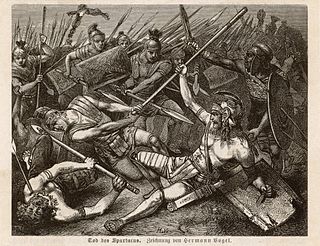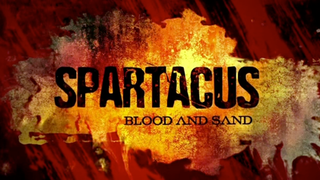
Year 73 BC was a year of the pre-Julian Roman calendar. At the time it was known as the Year of the Consulship of Lucullus and Longinus. The denomination 73 BC for this year has been used since the early medieval period, when the Anno Domini calendar era became the prevalent method in Europe for naming years.
This article concerns the period 79 BC – 70 BC.

The Third Servile War, also called by Plutarch the Gladiator War and The War of Spartacus, was the last in a series of slave rebellions against the Roman Republic, known collectively as the Servile Wars. The Third was the only one directly to threaten the Roman heartland of Italia. It was particularly alarming to Rome because its military seemed powerless to suppress it.

Spartacus is the third album by the German group Triumvirat. It is a concept album based on Spartacus, the Thracian gladiator who led the 3rd slave uprising in 73–71 BC. The lyrics were written by Hans Bathelt, with contributions by Jürgen Fritz. It was originally released in 1975 on the EMI label, and later distributed in the U.S. by Capitol. It debuted at number 27 on the Billboard album charts.
Gnaeus Cornelius Lentulus Batiatus was the Roman owner of a gladiatorial school in Capua. It was from this school that, in 73 BC, the Thracian slave Spartacus and about 70 to 78 followers escaped. The break-out led to the slave rebellion known as the Third Servile War.
Spartacus is a historical novel by the Scottish writer Lewis Grassic Gibbon, first published in 1933 under his real name of James Leslie Mitchell.
Crixus was a Gallic gladiator and military leader in the Third Servile War between the Roman Republic and rebel slaves. Born in Gaul, he was enslaved by the Romans under unknown circumstances and trained as a gladiator in Capua. His name means "one with curly hair" in Gaulish.

The Gladiators (1939) is the first novel by the author Arthur Koestler; it portrays the effects of the Spartacus revolt in the Roman Republic. Published in 1939, it was later reprinted in other editions.

Spartacus is a 1951 historical novel by American writer Howard Fast. It is about the historic slave revolt led by Spartacus around 71 BCE. The book inspired the 1960 film directed by Stanley Kubrick and the 2004 TV adaptation by Robert Dornhelm.
Oenomaus was a Gallic gladiator, who escaped from the gladiatorial school of Lentulus Batiatus in Capua. Together with the Thracian Spartacus and the fellow Gauls Crixus, Castus and Gannicus, he became one of the leaders of rebellious slaves during the Third Servile War

Spartacus was a Thracian gladiator who, along with the Gauls Crixus, Gannicus, Castus, and Oenomaus, was one of the escaped slave leaders in the Third Servile War, a major slave uprising against the Roman Republic. Little is known about Spartacus beyond the events of the war, and surviving historical accounts are sometimes contradictory and may not always be reliable. However, all sources agree that he was a former gladiator and an accomplished military leader.

The Spartacus Maxi-Trial was a series of criminal trials that were specifically directed against the activities of the powerful Casalesi clan of the Camorra. The trial was opened at the Corte d'Assise of Santa Maria Capua Vetere in Caserta. It was named after the historical gladiator, Spartacus, who led a rebellion of slaves beginning near Vesuvius against the ancient Roman Empire. It was named as such, in recognition of the need to fight a revolt in the Casalesi clan's territory. The trial was initially chaired by its president, Catello Marano on 1 July 1998. It continued until 19 June 2008, when its final verdict was eventually read.

Spartacus: Blood and Sand is the first season of American television series Spartacus, which premiered on Starz on January 22, 2010. The series was inspired by the historical figure of Spartacus, a Thracian gladiator who from 73 to 71 BC led a major slave uprising against the Roman Republic. Executive producers Steven S. DeKnight and Robert Tapert focused on structuring the events of Spartacus' obscure early life leading up to the beginning of historical records.

Spartacus: Gods of the Arena is a television miniseries broadcast by American cable TV Starz, as a prequel to Spartacus, which premiered January 21, 2011. The series follows the character Gannicus, the first gladiator representing Lentulus Batiatus to become Champion of Capua. Cast members and characters reprised from the original series include John Hannah as Batiatus, Lucy Lawless as Lucretia, Peter Mensah as Oenomaus, Nick E. Tarabay as Ashur, Lesley-Ann Brandt as Naevia, Antonio Te Maioha as Barca, and Manu Bennett as Crixus.

Spartacus: Vengeance is the second season of the American television series Spartacus, a Starz television series, which follows Spartacus: Blood and Sand. It premiered on January 27, and concluded on March 30, 2012. Its story follows Spartacus, after he and his fellow gladiators kill their master Batiatus and escape from his ludus, or gladiatorial training school. Cast members and characters who return from the first season include Lucy Lawless as Lucretia, Peter Mensah as Oenomaus, Manu Bennett as Crixus, Dan Feuerriegel as Agron, Nick E. Tarabay as Ashur, Viva Bianca as Ilithyia, and Craig Parker as Gaius Claudius Glaber. Dustin Clare also reprises his role as Gannicus from Spartacus: Gods of the Arena, the prequel to Spartacus: Blood and Sand.
Spartacus is a British television series produced in New Zealand that premiered on Starz on January 22, 2010, and concluded on April 12, 2013. The fiction series was inspired by the historical figure of Spartacus, a Thracian gladiator who from 73 to 71 BCE led a major slave uprising against the Roman Republic departing from Capua. Executive producers Steven S. DeKnight and Robert Tapert focused on structuring the events of Spartacus' obscure early life leading up to the beginning of historical records.

The Battle of Vesuvius was the first conflict of the Third Servile War which pitted the escaped slaves against a military force of militia specifically dispatched by Rome to deal with the rebellion.

The Gladiator is a tragic melodrama in five acts written by Robert Montgomery Bird originally starring Edwin Forrest. It first premiered on September 26, 1831 at the Park Theatre in New York City.














